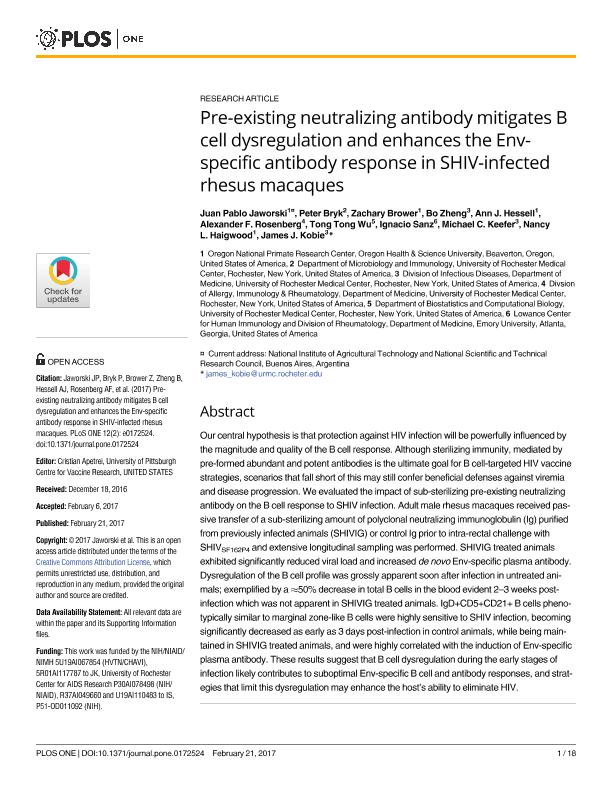Mostrar el registro sencillo del ítem
dc.contributor.author
Jaworski, Juan Pablo

dc.contributor.author
Bryk, Peter
dc.contributor.author
Brower, Zachary
dc.contributor.author
Zheng, Bo
dc.contributor.author
Hessell, Ann J.
dc.contributor.author
Rosenberg, Alexander F.
dc.contributor.author
Wu, Tong Tong
dc.contributor.author
Sanz, Ignacio
dc.contributor.author
Keefer, Michael C.
dc.contributor.author
Haigwood, Nancy L.
dc.contributor.author
Kobie, James J.
dc.date.available
2018-04-03T22:24:04Z
dc.date.issued
2017-02
dc.identifier.citation
Jaworski, Juan Pablo; Bryk, Peter; Brower, Zachary; Zheng, Bo; Hessell, Ann J.; et al.; Pre-existing neutralizing antibody mitigates B cell dysregulation and enhances the Envspecific antibody response in SHIV-infected rhesus macaques; Public Library of Science; Plos One; 12; 2; 2-2017; 1-18; e0172524
dc.identifier.issn
1932-6203
dc.identifier.uri
http://hdl.handle.net/11336/40626
dc.description.abstract
Our central hypothesis is that protection against HIV infection will be powerfully influenced by the magnitude and quality of the B cell response. Although sterilizing immunity, mediated by pre-formed abundant and potent antibodies is the ultimate goal for B cell-targeted HIV vaccine strategies, scenarios that fall short of this may still confer beneficial defenses against viremia and disease progression. We evaluated the impact of sub-sterilizing pre-existing neutralizing antibody on the B cell response to SHIV infection. Adult male rhesus macaques received passive transfer of a sub-sterilizing amount of polyclonal neutralizing immunoglobulin (Ig) purified from previously infected animals (SHIVIG) or control Ig prior to intra-rectal challenge with SHIVSF162P4 and extensive longitudinal sampling was performed. SHIVIG treated animals exhibited significantly reduced viral load and increased de novo Env-specific plasma antibody. Dysregulation of the B cell profile was grossly apparent soon after infection in untreated animals; exemplified by a ≈50% decrease in total B cells in the blood evident 2-3 weeks postinfection which was not apparent in SHIVIG treated animals. IgD+CD5+CD21+ B cells phenotypically similar to marginal zone-like B cells were highly sensitive to SHIV infection, becoming significantly decreased as early as 3 days post-infection in control animals, while being maintained in SHIVIG treated animals, and were highly correlated with the induction of Env-specific plasma antibody. These results suggest that B cell dysregulation during the early stages of infection likely contributes to suboptimal Env-specific B cell and antibody responses, and strategies that limit this dysregulation may enhance the host´s ability to eliminate HIV.
dc.format
application/pdf
dc.language.iso
eng
dc.publisher
Public Library of Science

dc.rights
info:eu-repo/semantics/openAccess
dc.rights.uri
https://creativecommons.org/licenses/by/2.5/ar/
dc.subject
Hiv
dc.subject
Anticuerpos
dc.subject
Bcells
dc.subject
Macaques
dc.subject.classification
Otras Ciencias Biológicas

dc.subject.classification
Ciencias Biológicas

dc.subject.classification
CIENCIAS NATURALES Y EXACTAS

dc.subject.classification
Inmunología

dc.subject.classification
Medicina Básica

dc.subject.classification
CIENCIAS MÉDICAS Y DE LA SALUD

dc.title
Pre-existing neutralizing antibody mitigates B cell dysregulation and enhances the Envspecific antibody response in SHIV-infected rhesus macaques
dc.type
info:eu-repo/semantics/article
dc.type
info:ar-repo/semantics/artículo
dc.type
info:eu-repo/semantics/publishedVersion
dc.date.updated
2018-04-03T18:23:12Z
dc.journal.volume
12
dc.journal.number
2
dc.journal.pagination
1-18; e0172524
dc.journal.pais
Estados Unidos

dc.journal.ciudad
San Francisco
dc.description.fil
Fil: Jaworski, Juan Pablo. Consejo Nacional de Investigaciones Científicas y Técnicas; Argentina. Oregon Health & Science University. Oregon National Primate Research Center; Estados Unidos
dc.description.fil
Fil: Bryk, Peter. University of Rochester Medical Center; Estados Unidos
dc.description.fil
Fil: Brower, Zachary. Oregon Health & Science University. Oregon National Primate Research Center; Estados Unidos
dc.description.fil
Fil: Zheng, Bo. University of Rochester Medical Center; Estados Unidos
dc.description.fil
Fil: Hessell, Ann J.. Oregon Health & Science University. Oregon National Primate Research Center; Estados Unidos
dc.description.fil
Fil: Rosenberg, Alexander F.. University of Rochester Medical Center; Estados Unidos
dc.description.fil
Fil: Wu, Tong Tong. University of Rochester Medical Center; Estados Unidos
dc.description.fil
Fil: Sanz, Ignacio. University of Emory; Estados Unidos
dc.description.fil
Fil: Keefer, Michael C.. University of Rochester Medical Center; Estados Unidos
dc.description.fil
Fil: Haigwood, Nancy L.. Oregon Health & Science University. Oregon National Primate Research Center; Estados Unidos
dc.description.fil
Fil: Kobie, James J.. University of Rochester Medical Center; Estados Unidos
dc.journal.title
Plos One

dc.relation.alternativeid
info:eu-repo/semantics/altIdentifier/doi/http://dx.doi.org/10.1371/journal.pone.0172524
dc.relation.alternativeid
info:eu-repo/semantics/altIdentifier/url/http://journals.plos.org/plosone/article?id=10.1371/journal.pone.0172524
Archivos asociados
